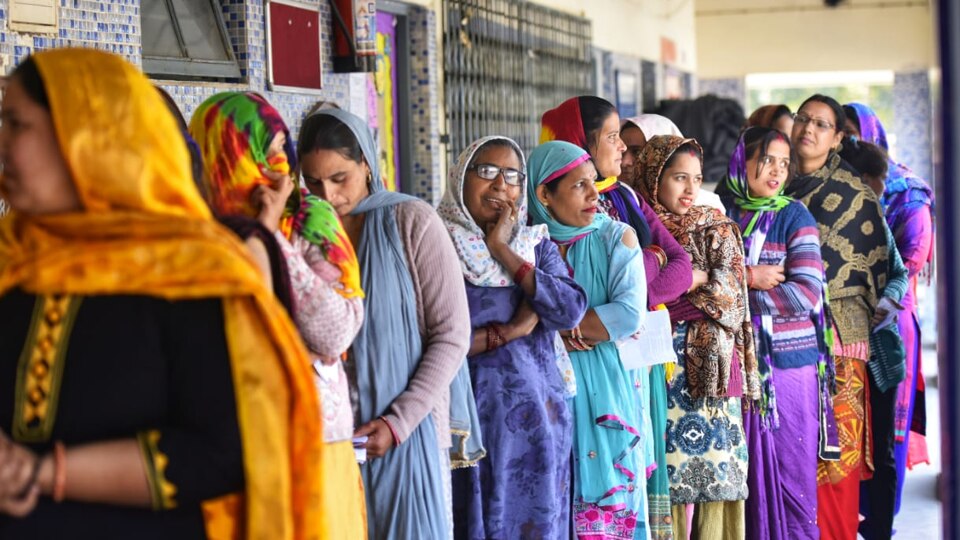‘One Nation, One Election’ In India: Charting A Wary Course
Sep 1, 2023 | Shalini Rai
FILE PHOTO: Voters stand in a queue as they wait to cast their vote outside a polling booth in New Delhi
There are just a few months left for assembly elections in five states; general elections are scheduled to be held in May 2024. For both political pundits and those who have a cursory interest in politics, this makes for an interesting time.
For the general public and the thousands involved in the conduct of these elections, it sometimes tends to become repetitive and burdensome, with elections scheduled to be held in some or the other state every few years.
Recently, the concept of ‘One Nation, One Election’ has been put forward by the current government. It involves the idea of simultaneously holding the Lok Sabha polls and elections to various state assemblies. The idea has been studied by the Law Commission of India and there is talk of a bill relating to this provision being tabled. A committee has also been constituted under former President Ra Nath Kovind, to study the matter in detail.
Under ‘One Nation, One Election’ (ONOE), elections to all the state assemblies and to the Lok Sabha would be held in one single cycle, with voting presumably taking place on a single day.
The proponents of the concept say it will help keep a check on party expenses and election expenditure. They say that when the first elections to the Lok Sabha took place in 1951-52, 53 parties contested the elections, around 1874 candidates participated and poll expenses were 11 crore, while in the 2019 elections, there were 610 political parties, around 9,000 candidates and poll expenses of around Rs 60,000 crore (declared by ADR) were yet to be declared by political parties.
Among the purported advantages of ONOE are that it will reduce the burden on the administrative set-up and security forces, timely implementation of government policies and saving public money. Its supporters say that it would also make it more convenient for voters to judge the policies and programmes of the government at both the central and state level and determine which political party made which promises and how they actually implemented them. Additionally, they say that if elections are held once in five years, all stakeholders — i.e. political parties, ECI, paramilitary forces, civilians — will get more time for preparations.
Among the challenges involved in ONOE is that the term of the state legislative assemblies and the Lok Sabha would need to be synchronised so that elections to both can be held simultaneously. Several constitutional amendments would also be needed in Articles 83, 85, 172, 174 and 356. The Representation of the People Act, along with related parliamentary procedures, will also need to be amended.
However, the core issue that poses a major obstacle to the implementation of the ONOE is the Parliamentary form of government which prevails in India, under which the government is accountable to the Lower House (Lok Sabha or Legislative Assembly). At the same time, it is also difficult to convince all political parties to accept ONOE.
Meanwhile, as far as logistics are concerned, the requirements for VVPATs and EVMs will double while holding simultaneous elections, because for every polling station, the Election Commission of India has to provide two sets (one for election to the Lok Sabha and the second for the Legislative Assembly). Other logistical considerations, such as additional requirement of polling staff, transporting materials to polling stations and better security arrangements, involving augmented number of central police forces, would have to be considered.
In the end, whether India — a vast, complex place to hold elections in at the best of times — would implement ONOE or not would depend on several extraneous factors and careful considerations, the least among which is the amenability of the electorate, the efficiency of the stakeholders and the deploy-ability of the logistical factors involved.
Allegations of manipulation of the electoral process to favour one, large, seemingly-all-powerful political dispensation have also begun surfacing. Critics are saying this is another way in which the current government is undermining democracy and one of its trademark processes — elections.
For the time being, one can only hope that the elections that are being held and will be held in the near future in India both at the Centre and the states, would be efficient and transparent. For the next steps, one would have to repose faith in the maturity and competence of the stakeholders of one of the world’s largest democracies.
